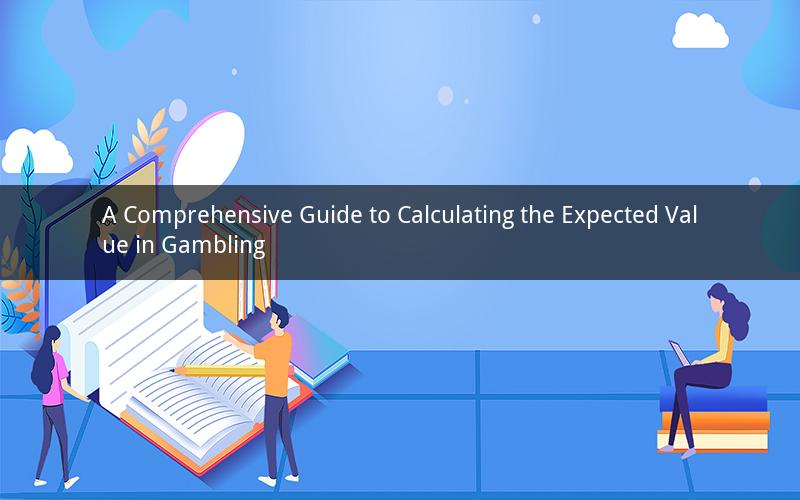
Gambling has been a popular form of entertainment for centuries, captivating millions of people worldwide. Whether it's playing cards, dice, slots, or roulette, the allure of winning big always prevails. However, it's essential to understand the concept of expected value (EV) to make informed decisions and maximize your chances of success. In this article, we will delve into the world of gambling and explore how to calculate the expected value of a game or bet.
Expected Value: What Is It?
Expected value is a statistical measure used to determine the average outcome of a random event. In the context of gambling, it represents the average amount you can expect to win or lose per bet over a large number of trials. By calculating the expected value, you can assess the profitability of a game or bet and make more informed decisions.
To calculate the expected value, you need to consider the probability of each possible outcome and the associated payoffs. The formula for expected value is as follows:
Expected Value (EV) = (Probability of Outcome 1 x Payoff 1) + (Probability of Outcome 2 x Payoff 2) + ... + (Probability of Outcome N x Payoff N)
Let's take a look at a simple example to illustrate the concept.
Example: Calculate the Expected Value of a Coin Flip
A coin flip has two possible outcomes: heads or tails. Each outcome has an equal probability of 0.5 (or 50%). Suppose you're betting $1 on heads, and if you win, you'll receive an additional $1. To calculate the expected value, follow these steps:
Step 1: Identify the possible outcomes and their probabilities.
Outcome 1: Heads (probability = 0.5)
Outcome 2: Tails (probability = 0.5)
Step 2: Determine the payoffs for each outcome.
Payoff for Outcome 1: $1 (winning the bet)
Payoff for Outcome 2: -$1 (losing the bet)
Step 3: Calculate the expected value using the formula.
EV = (0.5 x $1) + (0.5 x -$1) = $0.5 - $0.5 = $0
In this example, the expected value is $0, which means you can expect to neither win nor lose money in the long run when betting on a coin flip.
Calculating Expected Value in Various Gambling Games
Now that you understand the concept of expected value, let's explore how to calculate it for various gambling games.
1. Blackjack
Blackjack is a popular card game where the goal is to get as close to 21 as possible without going over. To calculate the expected value in blackjack, you need to consider the probabilities of hitting, standing, or doubling down, as well as the associated payoffs.
1. Roulette
Roulette is a classic casino game that involves betting on a number or a group of numbers. To calculate the expected value in roulette, you need to consider the probability of each number being spun and the associated payoffs.
1. Slots
Slots are the most popular casino games, and calculating their expected value can be more complex due to the numerous paylines and bonus rounds. However, you can still estimate the expected value by considering the probability of hitting a winning combination and the associated payoffs.
1. Poker
Poker is a skill-based card game that involves bluffing, reading opponents, and making strategic decisions. Calculating the expected value in poker requires analyzing the probabilities of each hand and the potential payoffs based on the number of players and the structure of the game.
Common Mistakes to Avoid When Calculating Expected Value
When calculating the expected value in gambling, it's essential to avoid common mistakes that can lead to incorrect assessments:
1. Ignoring the Time Value of Money
The time value of money is a critical factor to consider when calculating the expected value in gambling. Be sure to adjust your calculations for the time it takes to win or lose money.
1. Overestimating Your Chances of Winning
It's easy to get caught up in the excitement of gambling and overestimate your chances of winning. Always use accurate probabilities when calculating the expected value.
1. Failing to Consider the House Edge
The house edge is the built-in advantage that casinos have over players. When calculating the expected value, always take the house edge into account to determine the true profitability of a game.
1. Not Adjusting for Risk
Gambling involves risk, and some games are riskier than others. When calculating the expected value, be sure to adjust for the level of risk involved in a particular game or bet.
1. Not Using Historical Data
Historical data can provide valuable insights into the expected value of a game or bet. Be sure to analyze past outcomes when calculating the expected value to make more informed decisions.
Conclusion
Calculating the expected value in gambling is a crucial skill that can help you make more informed decisions and maximize your chances of success. By understanding the concept of expected value and using the appropriate formulas and probabilities, you can assess the profitability of various games and bets. Remember to avoid common mistakes and consider the time value of money, the house edge, and the level of risk involved. With a solid understanding of expected value, you can become a more strategic and successful gambler.